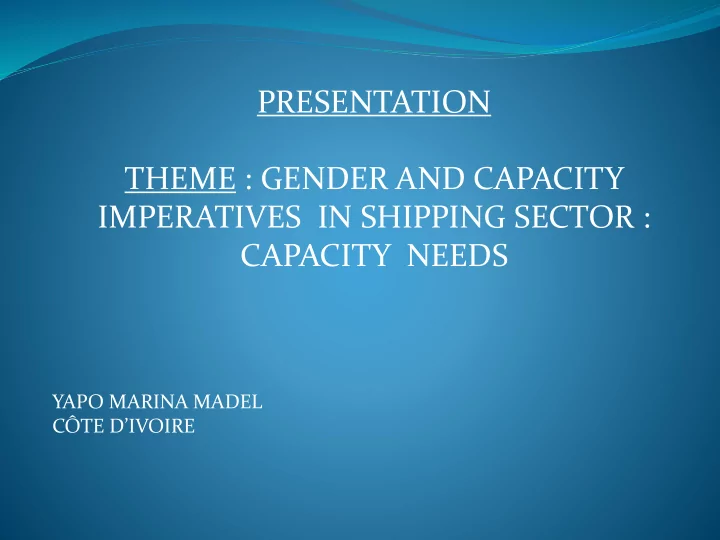

PRESENTATION THEME : GENDER AND CAPACITY IMPERATIVES IN SHIPPING SECTOR : CAPACITY NEEDS YAPO MARINA MADEL CÔTE D’IVOIRE
PLAN INTRODUCTION I- SITUATION OF WOMEN IN MARITIME SECTOR IN GENERAL AND IN SHIPPING FIELD IN PARTICULAR II- RECOMMANDATIONS ( CAPACITY NEEDS) CONCLUSION
INTRODUCTION The blue economy is all of the world’s water bodies, including lakes, rivers and groudwater, as well as seas and oceans. The blue economy can play a vital role in sustainable economic growth and social development of states. The main activities of blue economy are based on fisheries, acquaculture, tourism, transport, the port sector, the mining and the energy sector. It should be noted that blue economy approach not only emphasized these emerging and promising sectors, but also incorporate social considerations such as gender equality, food security, reducing poverty, resources preservation or also jobs creation.
INTRODUCTION For this presentation, we will debate to the issue relating to the gender in maritime sector, particulary the gender issue in shipping sector and capacity needs. How to promote representativity of gender in blue economy industry in general ? How to promote women professional skill in maritime technical field and their leadership ? What prospects for women in shipping field in particular ?
I- SITUATION OF WOMEN IN MARITIME SECTOR IN GENERAL AND IN SHIPPING FIELD IN PARTICULAR Today, the maritime and related industries continue to be one of the most male dominated sectors, including seafarers, fishermen, port operators, surveyors, port state control officers, and government officials. The under- representation of women in the maritime industry has not significantly changed over the past 25 years. In 1992, the number of women seafarers was estimated as 1- 2% of the total seafaring workforce, while the latest 2015 manpower report from Blatic International Maritime Council (BIMCO) and the International Chamber of shipping (ICS) indicates that only 1% of seafarers are women.
I- SITUATION OF WOMEN IN MARITIME SECTOR IN GENERAL AND IN SHIPPING FIELD IN PARTICULAR Indeed, stereotyping and discrimination against maritime women persist. They affect working conditions, equal access to education and training as well as career opportunities. While it’s still difficulte to conceive a woman as fisherman or officer onboard navy vessel or onboard mershant shipping, the fact remains that today, these activities are increasingly becoming feminized. However this integration is not without raising some difficulties.
I- SITUATION OF WOMEN IN MARITIME SECTOR IN GENERAL AND IN SHIPPING FIELD IN PARTICULAR On one hand, difficulties relating to work conditions in particular through hygiene, safety, the respect for the human person,degrading working conditions. For example, problems of introducing maternity leave for female seafarers, the difficulties involved in employing women on board ship operating in high risk piracy area or also the need to combat the resurgence of slavery or trafficking practices on board ship and sexual harassment
I- SITUATION OF WOMEN IN MARITIME SECTOR IN GENERAL AND IN SHIPPING FIELD IN PARTICULAR On the other hand, the difficulties related to high-level professional and technical training of women, dificulties encountered to complete their training courses, including access to ship officer functions. Many women are unable to find the necessary embarkation to validate their diploma, showing that much remain to be done in terms of equality access to training and to employment.
I- SITUATION OF WOMEN IN MARITIME SECTOR IN GENERAL AND IN SHIPPING FIELD IN PARTICULAR It should be noted that in côte d’ivoire, only about 15 women were able to benefit to seafarer training. These women encountered difficulties to complete their training. It should also be noted that ivorian maritime authority have been obliged to close the seafarers training school of Abidjan technical regional academy of sea because of the lack of national fleet to embark students.
II- RECOMMANDATIONS (CAPACITY NEEDS) Gouvernment must ensure parity in primary education and initiate from primary level teaching programs in sea trades ; Promote at national and regional level women training alongside men in maritime instituts to acquire the high level of skills required in maritime transport sectors; Encourage women training in the field of maritime navigation by offering professional and technical opportunities at maritime training institute; Establishment of national and regional policy to promote women embarkment on board ship to complete their training as seafarer ;
II- RECOMMANDATIONS (CAPACITY NEEDS) strenghtening of technical equipments of the national and regional maritime training institutes for an appropriate adapted technical training ; opening of national register to increase the number of national ships that can facilitate the embarkment of seafarers trainees ; facilitate by funding their missions, the participation of maritime sector women to the meetings organize by the regional women associations of maritime sector. These meetings are the framework to deal with the women issues in maritime sectors ;
II- RECOMMANDATIONS (CAPACITY NEEDS) identify women in the sector and keep register in different fields to facilitate professional promotion ; publish at national and regional level , books highlighting the success stories of women in maritime sector to serve as model to younger generations or future generations ; set up a mechanism of dissemination of training and capacity building available in iternational level.
CONCLUSION To conclude, it should be note that maritime industry need more women, especially in technical positions such as shipping and management roles. In this end, governments will have to take measures in training and capacity building and promotion of women in maritime sector including shipping field, supported by regional and international organizations.
Recommend
More recommend